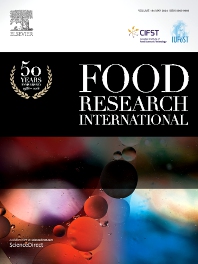Journals in Food contamination hygiene and toxicology
Journals in Food contamination hygiene and toxicology
Food Research International
Food Research International provides a forum for the rapid dissemination of significant novel and high impact research in food science, technology, engineering and nutrition. The journal only publishes novel, high quality and high impact review papers, original research papers and letters to the editors, in the various disciplines encompassing the science and technology of food. It is journal policy to publish special issues on topical and emergent subjects of food research or food research-related areas. Special issues of selected, peer-reviewed papers from scientific meetings, workshops, conferences on the science, technology and engineering of foods will be also published.Food Research International is the successor to the Canadian Institute of Food Science and Technology Journal. Building on the quality and strengths of its predecessor, Food Research International has been developed to create a truly international forum for the communication of research in food science.Topics covered by the journal include: food chemistryfood microbiology and safetymicrobiomefood toxicologymaterials science of foodsfood engineeringphysical properties of foodssensory sciencefood qualityhealth and nutritionfood biophysics analysis of foodsfood nanotechnologyemergi... technologiesSubjects that will not be considered for publication in Food Research International, and will be rejected as being outside of scope, include : Studies testing different formulations and ingredients leading to the choice of the best formulation or ingredient to be used in the manufacture of a specified food;Optimization studies aiming to determine processing conditions and/or raw materials that increase the yield of a production process or improve nutritional and sensorial qualities;Studies describing the production of ingredients and only their characterization without a strong mechanistic emphasis;Studies describing the biological activity of foods lacking identification of the compounds responsible for the reported activity will not be published. This is also valid for any other chemical compounds such as phytochemicals and minor components of foods. Compounds of interest need to be characterized at least by mass spectrometry-based methods.Studies that do not clearly prove the relationship between the structure of the compounds and their activity;Fingerprint... studies lacking molecular insights and validation sets;Studies on antimicrobial compounds that do not consider a validation step in foods, lacking full data on chemical composition indicating the compounds responsible for the inhibitory activity and, when appropriate, the use of molecular biology approaches to support the findings;Development of analytical methods not comprising a validation step in situ that represent the range of conditions faced during their application will not be considered;Surveys of chemical, nutritional, physical and microbiological hazards will not be considered. Only papers presenting a significant data set, wide coverage, novel and supported by adequate chemical or microbiological techniques will be considered;Pharmacol... and nutritional studies papers focusing in hosts rather than in foods.Pharmacology and nutritional studies that do not contain bioavailability or biofunctionality.Eng... studies lacking of mathematical verification or validation in situ, when appropriate;Fragment... studies, of low scientific quality, or poorly written.Studies with no food component.- ISSN: 0963-9969

Food Control
An official scientific journal of the International Union of Food Science and Technology (IUFoST).Food Control is an international journal that publishes manuscripts resulting from original scientific investigation into significant food safety and food quality concerns and preventative control measures that improve public health. Manuscripts submitted to this journal should document the problem of concern, proper hypothesis, experimental design, data analysis, and interpretation of the observed results, supported by relevant statistical analysis. The research should have an international scope, not limiting to local issues.The journal focuses on postharvest human food safety and quality issues and welcomes submissions related to the areas of interest listed below: Microbial contaminants and food safety - causes and control measures, including isolation, detection, and intervention methodsChemical and biochemical contaminants (mycotoxins included) - causes and control measures, including isolation, detection, and intervention methodsFood safety preventative control measures, including process development, HACCP, food safety objectives, quality assurance, and good manufacturing practicesFood safety risk assessmentCodes of practice, legislation and international harmonizationConsume... training and educationFood Authentication and TraceabilityThe scope of Food Control is comprehensive and includes original research papers, authoritative reviews, short communications, comment articles that report on new developments in food control, and position papers.The work described should be innovative either in the approach or in the methods used. The significance of the results either for the science community or for the food industry must also be specified. Contributions that do not fulfil these requirements will not be considered for review and publication.- ISSN: 0956-7135

Postharvest Biology and Technology
Postharvest Biology and Technology is devoted exclusively to the publication of original papers, review articles and frontiers articles on biological and technological postharvest research of horticultural crops including fruit, vegetables, grapes, flowers, tea and nuts, but excluding grains, seeds, forages and spices.All aspects of postharvest research throughout the supply chain will be considered, including storage technologies, treatments and underpinning mechanisms, quality evaluation, packaging, handling, and distribution.The following research areas will be considered if they directly affect postharvest science: preharvest factors, ripening and senescence, product safety, systems biology, bioinformatics, entomology, plant physiology, plant pathology, (bio)chemistry, molecular biology, biotechnology, engineering, modelling, economics, and technology development.Manuscri... on the effect of treatments on the storage life of a product should have a mechanistic component and must include research on the physiological effects and working principles of the treatments. Manuscripts that report on technological development must be related to the biological processes of the product and should include a strong relationship with postharvest biology and technology. These studies should also demonstrate robustness of use, with exploration of limiting factors, typically through assessments using populations from different growing or storage conditions, seasons, cultivars, etc. Manuscripts reporting novel fundamental and interdisciplinary research that addresses biological, technological, and socio-economic issues that impact technology acceptance, are encouraged.The focus of this journal is on fresh horticultural products. Manuscripts on products that will be further processed after postharvest storage, or on treatments beyond refrigeration, packaging and minimal processing will be considered but only if linked strongly to the quality and provenance of the products at the time of harvest.- ISSN: 0925-5214
